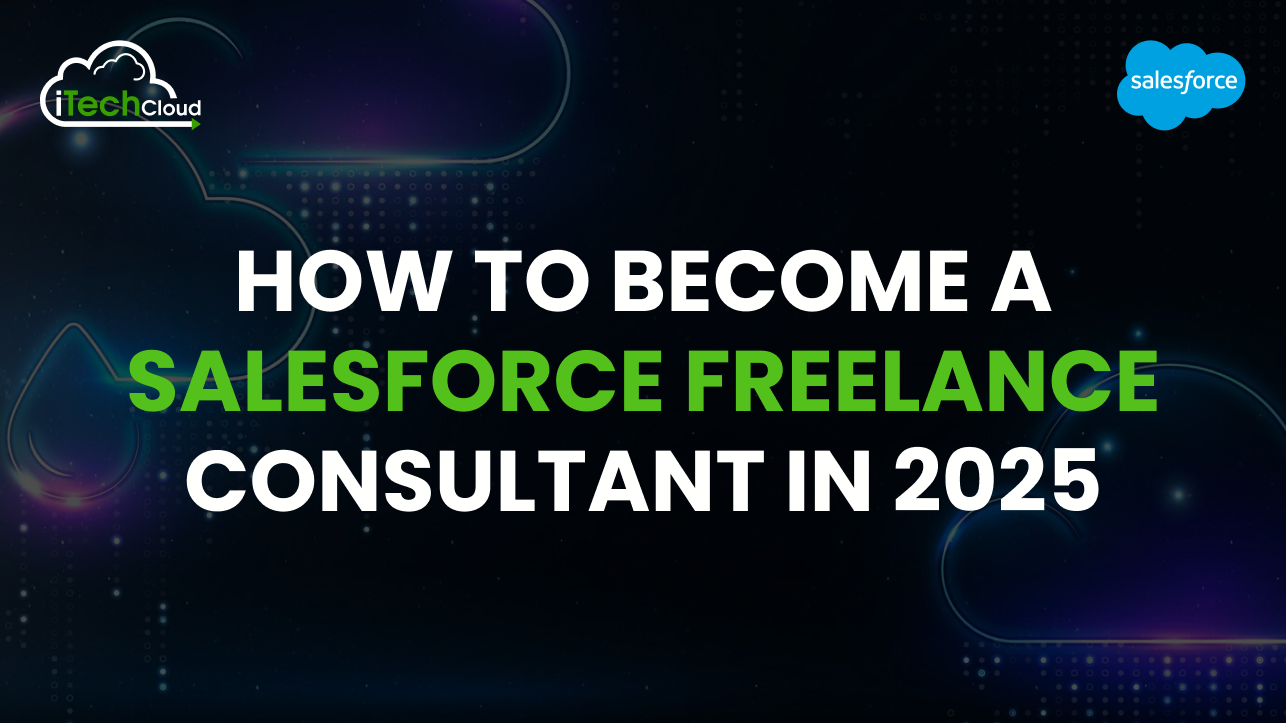Salesforce continues to dominate the CRM industry, and the demand for skilled consultants is growing. Freelancing in Salesforce offers flexibility, higher earning potential, and independence. This guide will provide a step-by-step roadmap if you want to transition into a Salesforce freelance consultant in 2025.
Why Become a Salesforce Freelance Consultant?
1. High Demand
Companies of all sizes rely on Salesforce to manage customer relationships, automate workflows, and drive sales. Businesses require skilled professionals to customize, implement, and maintain Salesforce solutions.
2. Lucrative Earnings
Freelance Salesforce consultants can earn between $50 to $200 per hour depending on experience and certifications. Compared to traditional employment, freelancing offers a higher earning potential.
3. Flexibility and Independence
You control your schedule, projects, and work environment. This flexibility is ideal for work-life balance.
4. Opportunity to Work Globally
Salesforce is a cloud-based platform, that allows you to work with clients from around the world, increasing growth opportunities.
Step-by-Step Guide to Becoming a Salesforce Freelance Consultant
Step 1: Gain In-Depth Salesforce Knowledge
Before freelancing, you need expertise in Salesforce platforms, tools, and applications.
1. Earn Salesforce Certifications
Certifications validate your expertise and enhance credibility. Essential certifications include:
- Salesforce Administrator (for managing Salesforce systems)
- Salesforce Platform App Builder (for developing applications)
- Salesforce Developer (for Apex and Lightning development)
- Salesforce Sales/Service Cloud Consultant (for specialized consulting roles)
2. Gain Hands-On Experience
Practical experience is crucial. You can gain experience through:
- Working in a Salesforce-related job
- Volunteering for nonprofit organizations via Salesforce.org
- Building projects on Salesforce Developer Edition
- Contributing to open-source Salesforce projects
Step 2: Build a Strong Personal Brand
To attract clients, you need to establish yourself as a trusted Salesforce expert.
1. Create a Professional Website
Your website should include:
- A portfolio showcasing your Salesforce projects
- Client testimonials (if available)
- A clear description of your services
- Contact details and a lead generation form
2. Optimize Your LinkedIn Profile
- Use a professional profile picture
- Write a compelling summary showcasing your expertise
- List your Salesforce certifications and projects
- Engage with the Salesforce community through posts and comments
3. Contribute to Online Communities
Participate in forums and groups such as:
- Salesforce Trailblazer Community
- Stack Exchange (Salesforce Stack Exchange)
- Reddit (r/salesforce)
Step 3: Identify Your Niche
Rather than offering generic Salesforce services, specialize in a niche that aligns with your skills and market demand. Some popular niches include:
- Sales Cloud Consulting (for businesses aiming to boost sales)
- Service Cloud Consulting (for improving customer service)
- Marketing Cloud Consulting (for marketing automation)
- Nonprofit Cloud Consulting (for nonprofit organizations)
- Salesforce Development (for custom applications and automation)
Step 4: Find Freelance Clients
Securing clients is a major step in freelancing. Here’s how to find them:
1. Join Freelance Platforms
Platforms where you can find Salesforce freelance gigs include:
- Upwork
- Freelancer
- Toptal
- PeoplePerHour
- Cloud Pacific (Salesforce-specific platform)
2. Leverage Your Network
- Reach out to past colleagues and clients
- Attend Salesforce events and networking meetups
- Engage with businesses in need of Salesforce expertise
3. Offer Free Initial Consultations
Providing free consultations can help you build relationships with potential clients and showcase your expertise.
Step 5: Set Competitive Pricing
Pricing your services competitively is crucial for attracting clients while ensuring profitability. Consider the following factors:
- Experience Level: Entry-level freelancers may charge $50-$75 per hour, while experienced consultants charge $100-$200 per hour.
- Project Complexity: More complex implementations and custom development projects require higher pricing.
- Market Demand: Research competitor rates on freelance platforms and adjust accordingly.
Step 6: Manage Projects Efficiently
Delivering high-quality work ensures repeat clients and referrals.
1. Use Project Management Tools
Leverage tools like:
- Trello or Asana (for project tracking)
- Jira (for development and issue tracking)
- Slack (for client communication)
2. Communicate Clearly with Clients
- Define project scope and expectations clearly
- Set deadlines and update clients regularly
- Maintain transparency in pricing and work process
3. Automate Repetitive Tasks
Use Salesforce automation tools like Flow Builder, Process Builder, and Apex triggers to streamline your workflow.
Step 7: Scale Your Freelance Business
Once you establish yourself, you can scale your business for more profitability.
1. Build a Team
Hiring junior Salesforce developers or consultants can help you take on larger projects.
2. Develop Passive Income Streams
Create Salesforce courses, write ebooks, or sell custom Salesforce templates to generate additional revenue.
3. Partner with Other Freelancers or Agencies
Collaborating with other freelancers can help you take on larger contracts and expand your service offerings.
Challenges of Freelancing in Salesforce and How to Overcome Them
1. Inconsistent Income
- Solution: Have multiple clients, create retainer contracts, and save for lean periods.
2. Finding Clients
- Solution: Regularly update your LinkedIn, engage in networking events, and leverage word-of-mouth marketing.
3. Keeping Up with Salesforce Updates
- Solution: Take new certifications and follow Salesforce blogs and webinars.
4. Managing Workload and Deadlines
- Solution: Use project management tools and set realistic deadlines with clients.
Conclusion
Becoming a Salesforce freelance consultant in 2025 requires a combination of expertise, branding, networking, and business acumen. By following the steps outlined above, you can build a successful freelance career in the Salesforce ecosystem and enjoy the flexibility and financial rewards that come with it.
Are you ready to start your Salesforce freelancing journey? Begin by earning certifications, building a strong online presence, and networking with potential clients. The demand for Salesforce expertise is growing—seize the opportunity today!


